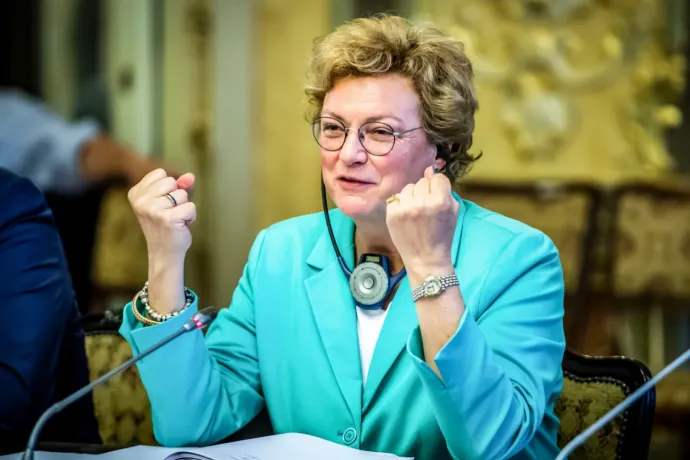Unanswered questions remain for EP Budgetary Control Committee after visit to Hungary

We had some very positive impressions, but we also saw some shortcomings, Monika Hohlmeier, Chair of the European Parliament's Committee on Budgetary Control said, assessing the outcome of their three-day visit to Budapest. She said that their goal was to make sure that EU funds reach the Hungarian people, but this requires a fair and unbiased distribution system.
"We are not making these things up", she said, adding that they have visited several member states, and "this is not about Hungary",
her Finnish group colleague Petri Sarvamaa, MEP for the EPP stressed. They did not come to challenge any party, as both he and the committee chairwoman belong to the same political group as Hungary's smaller governing party, KDNP.
Findings to be reported to the European Commission
Among the reasons for their visit, Monika Hohlmeier noted that Hungary was the first country to be subject to a rule of law procedure (with 25 out of 27 member states voting in favour). As we have written about in detail, this is part of a complex set of conditions blocking the payment of a significant part of EU funds available since 2021.
The EP is not directly involved in the procedures, but the EU's Court of Auditors and the European Commission are both represented in the delegation, with the latter playing a key role in unblocking the funds and negotiating the conditions. Petri Sarvamaa also indicated that a joint meeting will soon be held with Johannes Hahn, the European Commission's budget chief, so that they can collate the information they have gathered.
"This is my eighth visit to Hungary, but I always discover new things, many of which I think are unimaginable in another member state," Daniel Freund, a Green Party MEP, who got into a Twitter spat with Tamás Deutsch before the visit and then trolled Viktor Orbán's office in parliament said. Among other things, he denounced the decrees passed as part of the state of danger, and the multiplication of the capital's contribution to the central budget.
It is "vital" that EU funds reach Hungary, especially at a time of 25% inflation, but what they do not want is "to enrich Viktor Orbán's family and friends".
Judit Varga was missed
Members of the delegation met government officials including
- János Bóka, State Secretary for EU Affairs at the Ministry of Justice. The delegation had originally wanted to meet with the head of the ministry, Judit Varga, but she was unavailable, and there was no justification given, socialist MEP Lara Wolters said. Both she and Monika Hohlmeier were a little surprised that they had not been able to meet her, but such cases are normal, according to the committee chair.
- They were not left without a minister, however, and Tibor Navracsics, who led the negotiations on the suspended EU funds received their questions well, according to the committee president. The head of the regional development ministry also said on Wednesday morning that the meeting was objective and aimed at mutual understanding, although he sensed a bias and lack of preparation on the part of some representatives.
Problems at the State Audit Office, enthusiasm at the Integrity Authority
They also met with representatives of several organisations with a role in protecting the EU budget:
- László Windisch, President of the State Audit Office,
- Balazs Dencső, Director-General of the Directorate-General for Auditing European Funds,
- Ferenc Vágujhelyi, President of the National Tax and Customs Administration, and
- Ferenc Biró, President of the newly established Integrity Authority.
Here too, the delegation had a mixed experience. Monika Hohlmeier said the SAO president left several questions unanswered. However, Commission members praised the Integrity Authority and the cooperation between the Tax Administration and OLAF, the EU anti-fraud office.
The delegation also held talks with several committee chairmen of the National Assembly, as well as with Budapest Mayor Gergely Karácsony and representatives of the Association of Hungarian Local Governments. Monika Hohlmeier said that local authorities complained that public procurement was concentrated around certain companies and that they were not involved in the development of the spending plan for the EU recovery fund.
Monika Hohlmeier called on the government to implement the 27 super-milestones and four horizontal conditions as soon as possible, as they are blocking the disbursement of the €5.8 billion (roughly 2,200 billion forints) recovery fund, which has frozen some €22 billion (roughly 8,100 billion forints) from the "normal" EU budget.
For more quick, accurate and impartial news from and about Hungary, subscribe to the Telex English newsletter!